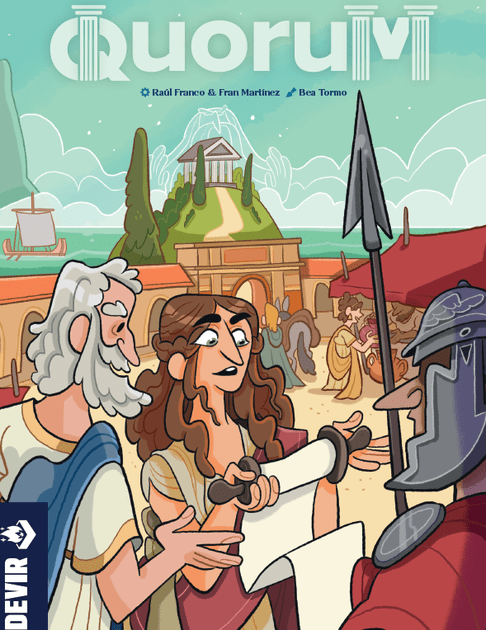SMOOSH JUICE
Designer Diary: Quorum | BoardGameGeek News

by Raul Franco
How the Game Was Born
At the beginning of 2023, as at so many other times, the two of us — Raúl and Fran — met up to play for a while and share ideas about a new game we wanted to develop. We had been wanting to design a family-friendly game for some time, but with enough depth for more experienced players to enjoy it, too.
In those conversations, the spark arose. As Fran said, it had to be a “light game in which players had the ability to decide”. An interesting challenge: balancing simplicity and strategy.
Defining the Limits
With clear premises, we began to define what the “rondel prototype” would be:
• Game duration: 20-30 minutes, enough for agile games, without sacrificing playability or planning.
• Number of players: From 2 to 4, an ideal range for dynamic games.
• Main mechanism: A rondel with different scoring areas where players compete to obtain the best position.
The next step was to define how the scoring would move within the rondel. We knew we would use cards, and we wanted to limit chance, without using dice. This gave birth to the idea of a central card market where each player chooses their cards; these cards then define the movement of the rondel and the player’s scoring strategy depending on how they are combined.
Setting a Theme for the Game
We already had a clear structure, but the soul was missing: the theme. We didn’t want something too specific or too abstract. We tried several options, but nothing fit properly…until in one of those spontaneous conversations, a phrase came up that solved the dilemma: “In Rome, everything fits.”
Rome was perfect: provinces for the rondel, areas of influence for the cards, and a setting known to everyone. Not only did we find the right theme, but we also came up with the name of the game: Quorum. The players would be Roman senators who share a consensus that everyone wants a prosperous Rome, yet struggles for power and influence between them are inevitable.
Building the Prototype
With the concept clear, we started to shape the game. We divided the cards into four areas of influence: military, architecture, trade, and intrigue. The first three were easy, but the fourth gave us a lot of trouble.
We finally found the solution: linking the intrigue cards to the “3” values of other cards. In this way, intrigue seeped into all areas, fitting them thematically and adding a new strategic dimension.
The Gods Appear
At first, the rondel had spaces with fixed score multipliers, but these were monotonous.
Looking for more variability, we decided to introduce God cards, which allow players to modify the rondel multipliers and gain influence in different provinces. This change made the games more strategic and dynamic.
Finishing the Final Details
With the mechanisms and theme well established, only final adjustments remained. One of the most important was modifying the scoring system for the provinces; instead of the winner taking the full multiplier and everyone else receiving nothing, now the non-winners also receive points based on their position. This reduced frustration and better balanced the competition.
With everything ready, we decided to try our luck and presented Quorum to the Verkami 2023 prototype contest. We reached the final as one of the top five designs with very positive reviews.
During the DAU event, in Barcelona, several publishers showed interest, including Devir. David Esbrí, editor of Devir, played a game with us and proposed a couple of interesting changes. Days later, we sent them a copy of the prototype and finally closed the deal with them.
Conclusions and the Future of Quorum
For us, Quorum has been a special project, a turning point in our journey as authors. We started with a simple conversation, built a game from the mechanisms and almost without realizing it, we ended up creating a strategic and exciting experience.
Now the game is in the hands of Devir; after a great job by the whole team and with the incredible art of Bea Tormo, we can only hope that it reaches the tables of the players and that they enjoy it as much as we enjoyed designing it. After all, as the saying goes: “All roads lead to Rome.”
Raul Franco Jiménez
Fran Martínez Rosa

/pic8454061.png)
/pic8720693.jpg)
/pic8708458.jpg)
/pic8708459.jpg)
/pic8705038.jpg)